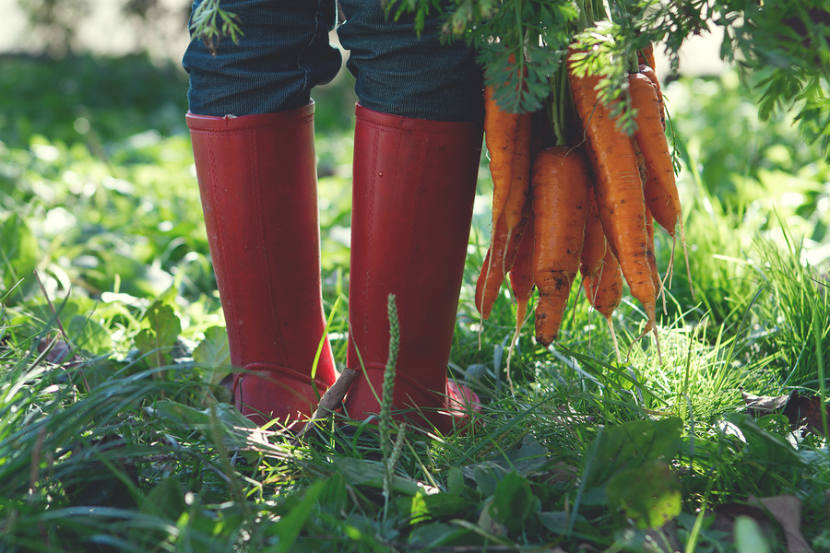
You may have heard that vitamin A helps keep your eyes and skin healthy. Are you concerned you’re not getting enough or that you need a supplement? Read on for what you need to know about vitamin A.
What can vitamin A do for me?
Vitamin A is a fat soluble vitamin that is stored in our liver. It contributes to normal growth and development while keeping our eyes, skin and immune system healthy. Vitamin A plays a key role in maintaining healthy vision.
Vitamin A usually comes from animal food sources, but we can also make it from some compounds found in plant foods, called carotenoids.
What are carotenoids?
Carotenoids are phytonutrients found in different amounts in vegetables and fruit. Foods that are brightly coloured such as dark green, orange, yellow and red vegetables and fruit contain carotenoids.
There are many types of carotenoids with different functions in the body. For example, some carotenoids (like beta-carotene) can be turned into vitamin A in the body.
Health Canada recommends that we eat one dark green and one orange vegetable or fruit each day. The reason for this recommendation is because the carotenoids from these foods contribute to our daily intake of vitamin A.
How much Vitamin A do I need?
|
Age in Years
|
Vitamin A needs micrograms (ug)/day*
|
Don’t exceed (ug/day)*
|
|
Men 19 and older
|
900
|
3000
|
|
Women 19 and older
|
700
|
3000
|
|
Pregnancy (19 and older)
|
770
|
3000
|
|
Lactation (19 and older)
|
1300
|
3000
|
*This amount includes sources of vitamin A from food and supplements.
Food Sources of Vitamin A
The table below will show you some of the animal foods that are sources of vitamin A and some of the plant foods that are sources of carotenoids.
|
Food
|
Serving size
|
Vitamin A (ug) RAE*
|
|
Animal sources (vitamin A)
|
|
Turkey Liver
|
75 g (2.5 oz)
|
8063
|
|
Chicken Liver
|
75 g (2.5 oz)
|
4054
|
|
Cod liver oil
|
5 mL (1 tsp)
|
1382
|
|
Baked Eel
|
75 g (2.5 oz)
|
853
|
|
Goat cheese, soft
|
50 g (1.5 oz)
|
204
|
|
Milk (skim, 1%, 2%, chocolate)
|
250 mL (1 cup)
|
142-158
|
|
Salmon
|
75 (2.5 oz)
|
112
|
|
Egg
|
1 large
|
70
|
|
Plant sources (carotenoids)
|
|
Baked sweet potato
|
1 medium
|
1096
|
|
Pumpkin, canned
|
125 mL (1/2 cup)
|
1007
|
|
Carrot juice
|
125 mL (1/2 cup)
|
966
|
|
Cooked carrots
|
125 mL (1/2 cup)
|
766
|
|
Cooked spinach
|
125 mL (1/2 cup)
|
605
|
|
Baby carrots
|
8 carrots
|
552
|
|
Butternut squash
|
125 mL (1/2 cup)
|
413
|
|
Dried apricots
|
60 mL (1/4 cup)
|
191
|
|
Cantaloupe
|
125 mL (1/2 cup)
|
143
|
*As retinol activity equivalents (RAEs).
What are RAEs? Vitamin A and carotenoids are measured differently. It takes many more carotenoids to make the same amount of vitamin A that you would get from animal foods. Using the measurement RAE helps to account for those differences. Here is the formula:
1 ug vitamin A = 12 ug carotenoids = 1 RAE
Do I need to take a vitamin A supplement?
No. It is not recommended that you take a vitamin A supplement. High doses of vitamin A are toxic. We can store vitamin A in our liver for long periods of time. This means we are not at risk for becoming deficient in vitamin A, even if we don’t eat vitamin A rich foods for a few days.
Balanced, healthy eating based on Canada’s Food Guide will provide enough vitamin A for your daily needs either from animal food sources of vitamin A or the carotenoid rich dark green and orange vegetables and fruit.
Can your skin turn yellow if you eat too many carrots? Yes. This happens because we store beta-carotene (which is a yellow-orange pigment) in the cells under our skin. Eating a lot of beta-carotene from foods can make your skin look yellow, but this is not harmful to your health.
Vitamin A supplements and pregnancy
Women who are pregnant should not take a vitamin A supplement, and should limit their consumption of liver, because of its high vitamin A content. Too much vitamin A can cause birth defects.
The vitamin A found in prenatal supplements is a safe amount to take during pregnancy.
Can taking a vitamin A or beta-carotene supplements help prevent cancer?
No. It is not recommended that vitamin A or beta-carotene supplements be used to prevent cancer. In fact, research has shown that in some cases, taking these supplements can increase the risk of some types of cancer.
Meal and snack ideas that are a source of Vitamin A
-
Switch up white potato for sweet potato. Sweet potatoes can be roasted, mashed, baked and even grilled. They taste great when tossed with olive oil and grainy mustard, or drizzled with maple syrup and brown sugar.
-
Add spinach to everything. Toss it into omelets, soups, stews, pastas and rice dishes just before you’re ready to serve. It’ll cook up in no time and you’ll get your dark green vegetable for the day.
-
Make a tropical smoothie with milk or fortified soy beverage and frozen cantaloupe, papaya or mango.
-
Keep healthy snacks at work: baby carrots, dried apricots or sliced red bell peppers.
Recipes
Spinach and Mushroom Lasagna
Grilled Asparagus and Sweet Potato with Curry
For preparation tips and recipe ideas for vitamin A and carotenoid rich foods:
Pumpkins
All about carrots
Asian Vegetables
Winter Squash
For more nutrients:
Vitamin E
Vitamin C
Vitamin D
Selenium
Calcium
Vitamins and Minerals FAQs
Last Update – March 21, 2019